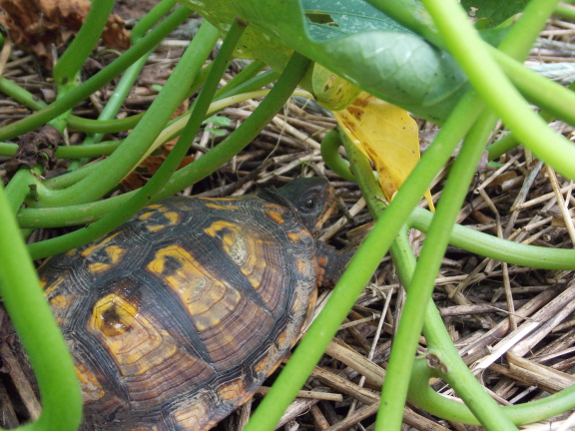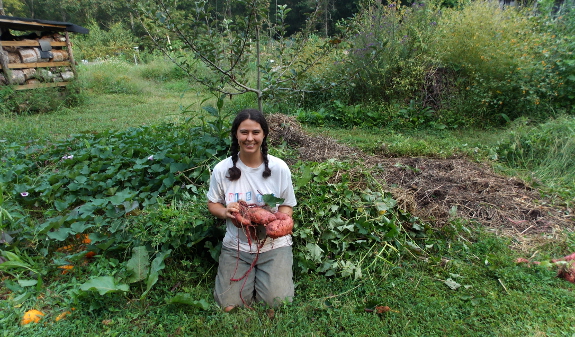
Sweet potato cover crop

People throw around
the term "symbiosis" all the time, but most don't realize that the
word only means that two (or more) organisms are living close
together, not that they're helping each other out. Symbiotic
relationships can be parasitic (one organism benefits and the
other is harmed), commensalistic (one organism benefits and the
other is neutral), or mutualistic (both organisms benefit).
Why should you
care? If you're a permaculturalist trying to build guilds or
an organic gardener experimenting with companion planting, it's
handy to know where your combinations sit on the
mutualism-to-parasitism spectrum. That way you can grade the
interactions --- parasitism is probably a failure, commensalism is
a moderate success, and mutualism is the holy grail of the guild
world.

While my sweet-potato
cover-crop experiment is closer to a commensalism than a mutualism, I'm so
happy with the results that I'm going to deem it a glowing
success. This spring, I set out sweet potato slips into some
beds I've developed just past the root zone of a peach and an
apple in the forest garden, and the sweet potatoes thrived.
They soon formed a living mulch beneath the trees, but only barely
rooted there, so they didn't steal any nutrients. When
harvest time came this week, I discovered huge, beautiful tubers,
and the tops of the sweet potatoes created a deep mulch ring
around each tree, perfect for taking the trees into winter.
Meanwhile, the bare ground left behind in the sweet potato beds
made it easy to sprinkle oat seeds for even more biomass
production.
What would turn this
symbiosis from a commensalism to a mutualism? If the sweet
potatoes had done better close to the trees than they would have
done in a vegetable garden bed. I'd be curious to hear if
you've developed any true mutualisms in your garden, but in the
meantime, I whole-heartedly recommend sweet-potato cover crops for
anyone needing to build biomass around fruit trees.
Want more in-depth information? Browse through our books.
Or explore more posts by date or by subject.
About us: Anna Hess and Mark Hamilton spent over a decade living self-sufficiently in the mountains of Virginia before moving north to start over from scratch in the foothills of Ohio. They've experimented with permaculture, no-till gardening, trailersteading, home-based microbusinesses and much more, writing about their adventures in both blogs and books.
Want to be notified when new comments are posted on this page? Click on the RSS button after you add a comment to subscribe to the comment feed, or simply check the box beside "email replies to me" while writing your comment.

Karen --- I read and enjoyed Paradise Lot. You can see my review here (and don't miss the search box in the sidebar, which makes it easy to find reviews of books you're wondering if I've read! )
)
We have a fence all the way around our perimeter now, which is how we manage to grow sweet potatoes despite serious deer pressure. I think the crop is close to their favorite!